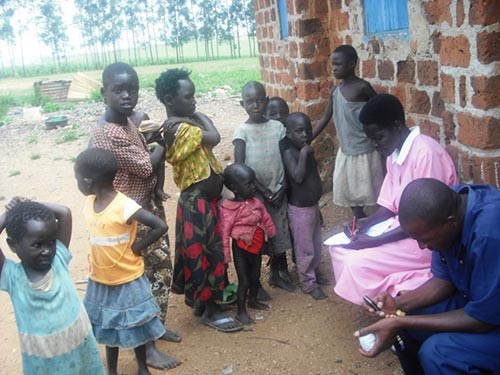Latrines
Although to ensure the health and well-being of the poor in the developing world the help of doctors and medicine is important, the primary requirements are clean water and adequate toilet facilities.
The simplest form of toilet is a ‘long drop’, where a toilet block is built over a large pit. Human excrement accumulates and degrades in-situ. Without proper control of faeces bacteria will rapidly multiply and promote disease within the community.
Two facilities have been built at Camp A and in the last year the first new facility was constructed at Camp B. The long drop was dug out by the refugees and the toilet block built by people from camp A. Those who undertook the work had been put through a training course run by serve Africa to enable them to acquire basic skills in construction. Here are the villagers emptying the latrines:
_low_res.jpg)
_low_res.jpg)
Fuel Efficient Cookers
Besides collecting water the other major task women and children in the developing world face is collecting firewood for cooking. The cookers generally used also generate a large amount of smoke.
As cooking is generally done inside it means both adults and children are exposed to a polluted atmosphere. This circumstance is a major cause for under fives to have poor lung development, suffering illness and breathing problems, and subsequently premature death.
Serve Africa used a local charity, Kulika, to train the refugees to build fuel efficient cookers. The cookers use about half the amount of fuel of a conventional cooker. They also operate using charcoal, which significantly diminishes smoke generation.
Health Care and Training
Serve Africa employ a nurse, Margaret, who visits both camps and the primary school each week.
She provides basic medical care and also ensures younger children, who are often malnourished, are provided with an improved diet. The primary element of this diet is soya milk.

Margaret and Lydia also provide health education for the communities. A specific issue in Uganda is the high percentage of the population having HIV/Aids. Advice is provided on the use of condoms and maintaining monogamous relationships. In addition, now the camps have access to a permanent and safe water supply, the benefits of regularly washing hands is promoted. Malaria prevention and the correct use of mosquito nets is another very relevant topic that is addressed.